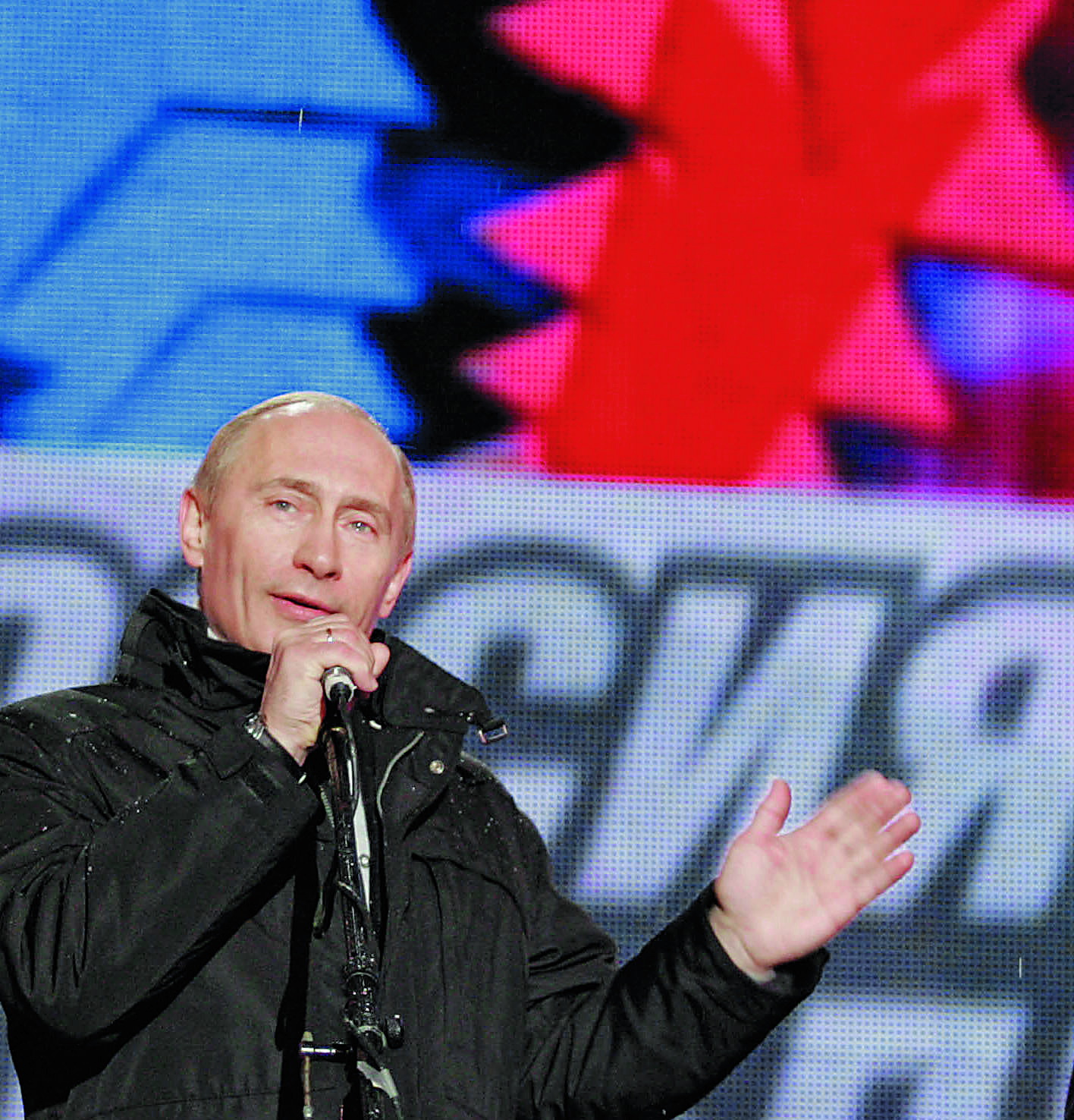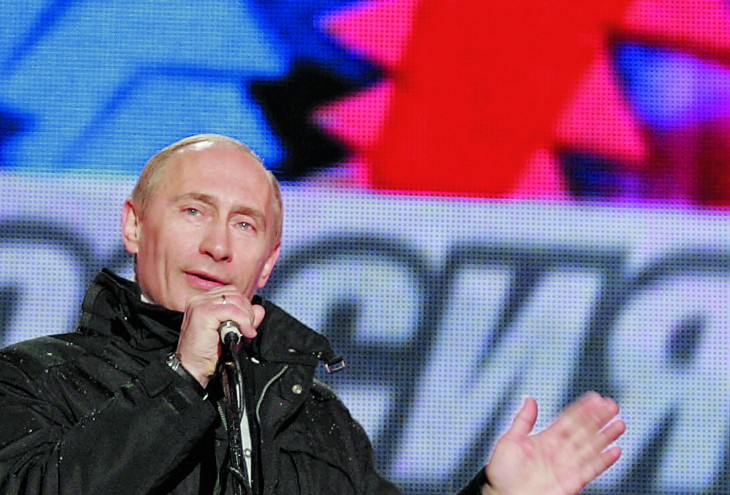
Bulat Abdulin
Present Russian presidential elections are happening in a rather complication situation. The tension demonstrates itself both inside Russia and in its international policy. Of course, the nature of present situation was under influence from growing protests of the populations of major urban communities, after the parliamentary elections of December 2011. Consequently, Vladimir Putin’s election process, seen as something rather routine several months ago, transformed into something requiring the maximum concentration of strength and efforts by all of Vladimir Putin’s team.
We must note, that said team rather effectively handled that complicated situation. From the tactical standpoint, one should note Vladimir Putin’s certain farness Yedinaya Rossiya Party, first of all, anti-Orange meetings, secondly and a grand scale Public Relations campaign, in the third run, which campaign was inclusive of multiple elections promises, especially ones for socially vulnerable layers of the population. In a rather sophisticated manner did Moscow neutralize Grigory Yavlinsky’s election campaign, which individual, theoretically, was in position to accumulate the protesting liberal electorate and substituted him with Mikhail Prokhorov, which candidate attempts to use same thoughts as did Yavlinsky.
Putin’s men mobilized all, including Russia’s most trialed and reputable public administration official, the perpetual Emergency Response and Relief Minister Sergey Shoigu, which individual enjoyed unquestionable popularity in the society since the 90-s of the 20th Century. It was particularly Sergey Shoigu, who attended the presidential candidates’ public debates instead of Vladimir Putin. And, finally, Vladimir Zhirinovsky, who outcropped bursts of active criticism of the ruling regime, Yedinaya Rossiya and Putin himself, in an obvious attempt to struggle off a part of protesting electorate.
With all due respect to tactics, one should mind that Putin used heavy artillery to implement his strategy for presidential elections campaign and things are very not simple in that sphere, although said strategy did ensure the achievement of desired effect. Latest public polls showed Putin already exceeded the level of 50% to 52% of supportive votes, so critically important particularly during the first round of presidential elections. For Vladimir Putin, victory in the first round was of principal importance, not only to prevent exposure of self to risks of unpredictable development of events, in the course of the second round, but also not to create impression that a significant part of the Russian society was against him. First round victory was not that important in early 2000-s, when Putin’s reputation and standing was imperturbable. Today, after meetings at Bolotnaya Square and at the edge of rather possible drop down in oil prices with the inevitably consequent public concerns and dissatisfaction, Vladimir Putin needs the absolute victory.
Putins’s team, apparently, chose the most practicable strategic course of action, given the present situation in the country. They switched orientation towards the philosophy of the powerful Russian civilization. To ensure achievement of that strategy, they mobilized famous patriots, such as Dmitry Rogozin, a Russian Vice-Premier for defense affairs and former head of the Congress of Russian Communities/Diasporas. Rogozin already released his appeal to local nationalistic circles to support Putin and act against those, undermining the idea of powerful Russia.
In order to achieve above goal, Moscow presently maintains a rather robust discussion with West. Present dispute arising between Russia and West all have to do with Russian presidential elections. That is why Putin’s communications of Russian leadership’s plans to allocate RR23 trillion for procurement of new weapon systems and war machines presume compensation for poor funding of the needs of the Russian military complex, in the past 20 year. That does not very much appear a muscle-flexing exercise, for Moscow is not likely to be able to inject claimed amount into defense, especially if oil prices reduce. That information was addressed to the feelings of people sharing nostalgia about the past times of the powerful empire.
Such strategy will resolve many problems that Vladimir Putin has to face, because it justifies his negative perception of the Bolotnaya Square protesters. Russian patriots believe that those protesters are on the side of Western Liberals and wish to weaken the historic strength of Russia. With such formulation of the philosophy, Putin may count on the sincere support from those seeking strong power in the country and those related to defense and military industry.
To all those individuals, does Putin address his program of restoration of the former state power of Russia. Characteristic, in this instance, is the fact that in restoring the former standing of the Russian Federation, Putin will step on the way curbed by many contradictions, for example necessity to justify to many parties, especially those outside Russia, why they should deem restoration of the former empire as a favorable event. And while inside Russia, the usage of such philosophy is obvious and justifies all efforts, outside Russian Federation and even in relationships with allied parties, such approach triggers occurrence of numerous questions.
Given the above, Putin demonstrated the top level of ideological maneuvering, in one of his core publications dedicated to nationalities issue (article of 23 January 2012). His core ideological argument was based on something broader than just the collapse of the Soviet Union, which event he once called XX century’s grandest geopolitical catastrophe.
He wrote: “…our national and migration problems root back to the destruction of the USSR. In point of fact, historically, the root back to the destruction of the Grand Russia, the foundation of which formed in the 18th Century”. The quoted phrase is as powerful as a political statement communicating that all present problems of Russia derive from the collapse of its historic empire.
The father in, the deeper. Putin onwards wrote: “in the heat of struggle against the “Union Center” 20 years ago, deputies representing Russian Soviet Federative Socialist Republic declared sovereignty and triggered the process of construction of “National States”, even inside Russian Federation itself”. The latter phrase, in fact, appears curious. Although the emphasis was, kind of, given to the autonomies emerging in the territory of Russia and attempting to acquire more independence, Putin’s key regret was about process of construction of the new national states, in principle, -i.e. Kazakhstan and other newly independent states.
In furtherance to above regret, Putin wrote that: “now all those who took part in said process are blaming each others. But there is one obvious thing – their actions equally and inevitably led to collapse and separatism. And they failed to collect courage and responsibility, as well as political will, to persistently and continuously protect the territorial integrity of the Motherland”. Because Russia, represented by the Russian Federation and its national borders, did not lose territories, “territorial integrity of the Motherland” apparently implies the territory contained within the borders of the former USSR.
In other words, Putin, in his article, directly expressed opposition to independence of all states that came into existence after the collapse of the USSR, including Kazakhstan. Of course, many parties, including those in Kazakhstan, share that belief, but from the standpoint of official national ideology and interests of the state of Kazakhstan, that phrase is not as much an arguable statement, as it is a big problem. Differently from many other former Soviet states, Kazakhstan always maintained good relationships with Moscow. In doing so, we avoid reference to historic problems. It was just informally agreed between the two sides, that neither of them would raise issues that could trigger emotions among patriots in both countries. But the denial of independence of Kazakhstan is a serious event, not to mention common integration processes and Astana’s tremendous efforts to persuade all of us that our integration with Russia does not envision any political backgrounds.
The only issue that can somehow comfort us is the understanding of the fact that we observe pre-elections technologies. And even if what we see is Freudian slip, then we should rather pretend we did not notice anything. Because even Moscow’s presently robust attitudes in relationships with West are also parts of pre-elections campaign and bargain over interests, otherwise Russia would long time ago supply Iran with Anti-Air Missiles. One phenomenon became clear – present Russia does not wish to restore to times of Cold War, and there are no Stalins or Khruschev’s in the Kremlin now. Likewise, is not Russia capable to restore its former empire.
It is unlikely that many people outside Russia will support Putin’s thought that we built the Russian Empire all together. “Russia appeared and developed throughout centuries as a multi-national state. Expansion over enormous territories, which process was the core of the whole history of Russia, was a common cause for many nations” . Such thought is, undoubtedly, a subject of historic discussions. Times of big empires are gone. Better concentrate on resolution of tactical issues.



